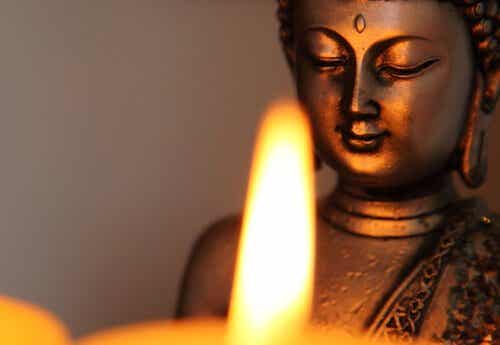Some feelings are inevitable for the human being. In this article, we will reveal a number of Buddhist-inspired tips for dealing with anger.

Last update: May 01, 2020
Buddhists think that dealing with anger requires precise training. To do this correctly, you need to adopt certain attitudes and virtues that are worth developing. By doing so, this negative feeling will not cause serious consequences or become a self-destructive force for us and others.
Of course, everyone gets angry and that's normal. The problem is that we don't always know how to deal with anger correctly, without hurting others and ourselves. Let's not forget that, sometimes, a few minutes of anger can change an entire life.
“The mind is everything. What you think, you become. "
Buddha
In Buddhism, meditation is inherent as a way to achieve greater self-control and self-awareness. Likewise, there are some principles that, together with meditation, will allow you to cope with anger in the best possible way. In this article we present seven of them. Don't miss them!
Dealing with anger thanks to 7 precepts of the Buddha
1. Acceptance, an axis for dealing with anger
Buddhism stresses that the best way to start dealing with anger is to accept that we are sorry to do so. It sounds like a truism, but many people give anger different names. They try to soften it or make it up because trying it makes them feel ashamed.
No emotion is inherently negative or positive. The negative or the positive depends on how we manage what happens to us and what we feel. Human beings are subject to experiencing all kinds of feelings, the important thing is to recognize and accept them.
2. Be heroes
If in the face of anger the only thing we can do is explode and unleash our impulses, it means that we are still too weak to deal with it. Only strong spirits, heroes, are able to manage and control it fully. They know that anyone who lets anger go out of control tends to generate new evils.
The hero never reacts and harnesses the power of patience. He does not let himself be carried away by instinct, but waits, he chooses mental calm so as not to become a prisoner of his own impulses. We simply give ourselves the time we need to be able to respond to situations intelligently.
3 Realism
Anger is an emotion that endangers and threatens physical and mental health. He is not an ally, but on the contrary a real enemy. However, we often make the mistake of considering it as positive, as something that allows you to reaffirm your ego and free what you feel inside. But that's not the case at all.
You don't have to get carried away by this mirage. Likewise, it is possible that the same anger leads you to overstate the situation. That is why it is important to be realistic, to rely only on what you see and hear. Is the situation really that bad? Did the person who teased us really did it on purpose? Is he really trying to harm us? We avoid destructive behaviors, because they will lead us away from our goal. That is to reach a solution.
4. Observation to deal with anger
Self-observation is a very useful way to deal with anger. Before reacting, it is good to pause for a moment to explore what is happening in our body. How is our breathing? Why are our muscles tense? Do we have stomach pain?
In the same way, it is important to explore our ideas. Instead of thinking about the other person or the situation that causes discomfort, let's focus on ourselves. This observation exercise has great power that allows you to deal with anger and reduce it.
5. Learn from the enemy
Buddhism recommends caring for, protecting and preserving the health of the enemy. It may seem contradictory at first, but it is a compassionate and intelligent way to deal with anger. The question we must ask ourselves is: "What can I learn from that person, object or situation that causes me anger?".
It is important to be willing to compromise. To think that neither we are possessors of the truth, nor the others must necessarily agree with us. Let's try to find the validity of what creates opposition to us. Surely, there is something new, interesting and different in the other as well.
6. Keep death in mind
It is very common to meet people with near-death experiences that have changed their perspective on life. It happens because these situations crudely show that everything ends, without any appeal. For this reason, it is not worth wasting the little time of one's existence.
A good idea would be to ask ourselves how important a person or situation would be if it were the last day of our life. Is it really worth spending the remaining hours on that situation, that feeling, or that person?
7. Seminars
According to Buddhists, and common sense, we usually reap what we sow. We are therefore responsible for our sufferings. If we sow anger, we will reap anger. If we start a cycle of violence, sooner or later, we will end up being victims directly or indirectly.
We need to take care of the way we react, think about our well-being and be aware of the implications that come with it.. Doing all of this when you are in anger is impossible. The most appropriate thing to do, therefore, is to allow yourself a margin to reflect.
All these principles of Buddhism are perfect for dealing with anger. Above all, they try to remind us that acting impulsively almost always leads to negative consequences. It is our mind that must direct our actions, instead we avoid that actions condition the mind.


























